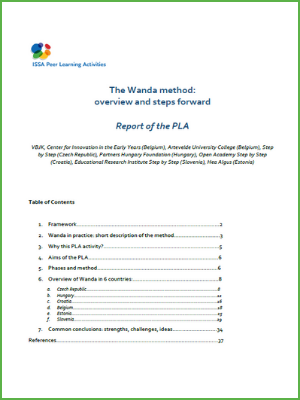
The Wanda method: overview and steps forward report is the result of an ISSA Peer Learning Activity and involved several members of the ISSA network.
WANDA is a method developed in 2010 in order to support professional group reflection, with specific attention to valuing each other, with respect towards the child, the family, the colleagues, the community. WANDA aims to improve quality in ECEC for children and families.
The specific objectives of the PLA were:
1) Get an overview of what (and how) has been done with Wanda on a local level in each country: which services have been involved, with which frequency did they organize Wanda sessions, what has been the impact, what are the strengths and the critical points that come out, what are the needs of the target groups etc.
2) Co-reflect on the strengths and challenges, with the aim of fine-tuning the different Wanda paths: the aim is not homologating the peculiar experiences of the different contexts, but finding coherency within the differences (agreeing on what is Wanda and what it is not, discussing possibilities and borders, stimulating each other by getting to know the different experiences that took place etc.).
3) Consider all this, thinking together about possible next steps for Wanda, both on a local level in each country involved, and on an international one (f.e. through EU projects).


